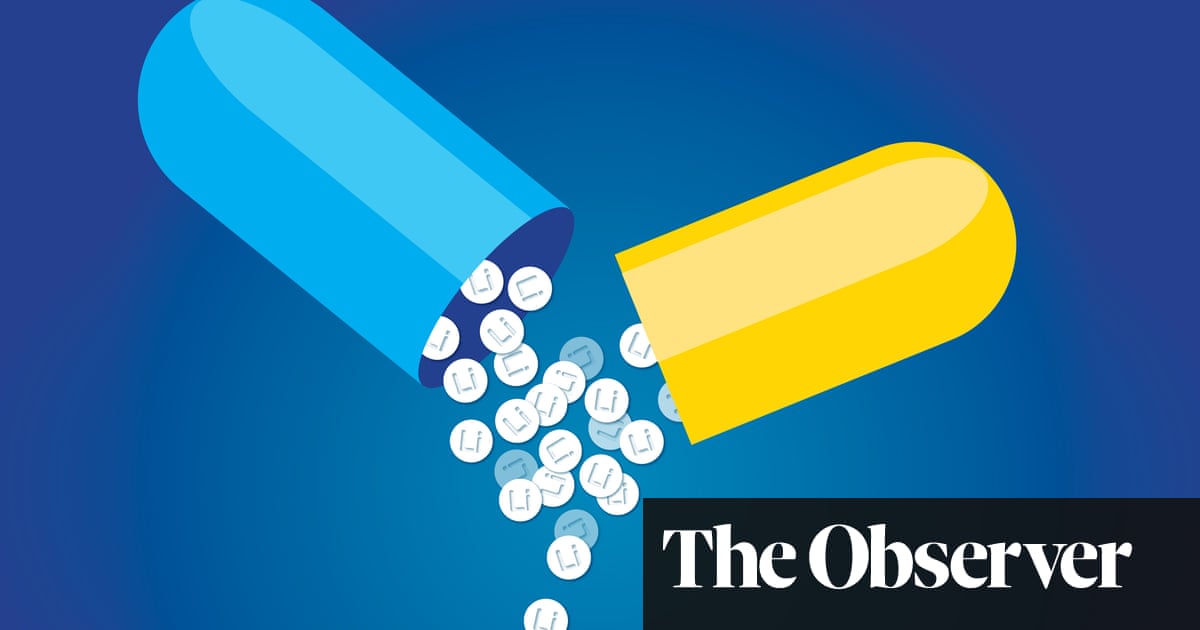Occupational stress is a trigger for Rebecca Wilde, a 32-year-old tech worker in Buckinghamshire. Four years ago, work pressures combined with family issues affected her sleep, leading to a severe manic episode. She was hospitalised for a month and a half, and diagnosed with type 1 bipolar disorder, also known as bipolar 1, a mood condition that can have devastating consequences if not managed well. Mania, and sometimes psychosis, is present in type 1.
Wilde was experiencing both: at one point, she thought she could talk to dogs. She was put on the antipsychotic drug olanzapine and another mood stabiliser, lithium. She has now been taking lithium alone for a year, and it has been transformative. “On the lithium, I definitely feel like me,” she says.
While Wilde was transitioning to lithium only, researchers were furiously debating the evidence around the drug. In 2023, the journal Bipolar Disorders published an editorial co-written by editor-in-chief Gin S Malhi, titled “Lithium first: not merely first line”. This asserted that lithium should be considered not only as one of several possible initial treatments for bipolar disorder, but as the first and foremost of these. Lithium “needs to be championed”, maintains Malhi, a visiting psychiatry professor at Oxford University.
This is not the only heated dispute among lithium researchers from the past couple of years. A 2024 critique led to professors trading words such as “pseudoscience” and “extraordinarily venomous”. Feuds such as these point to the high stakes over the declining popularity of lithium.
Medicinal lithium is remarkable. There is more evidence of lithium’s effectiveness in managing bipolar disorder than for any other medicine. As a naturally occurring ion, lithium can’t be patented. And unlike most medicines, it’s not metabolised by the body.
Malhi explains why this is significant: “With lithium, the body can be thought of simply as a bucket of water with input and output of fluid. Then, whatever lithium you add gives you a plasma level. It means we can accurately make changes with sensitivity around plasma levels and clinical response and tolerability.”
Eeeeh. I kinda get why it fell out of favor. For context, the weird thing about the nursing perspective vs the MD perspective is that you don’t get as much of the benefit of large studies, but you also aren’t as sensitive to big pharma marketing studies either which… good AND bad. Like for school I had to take a class on evaluating the validity of drug trials and one of the studies mentioned was taking advantage of the fact that there’s basically no equivalent doses between different antipsychotics but you can also look at the doses from an experienced clinician perspective and be like huh they’re saying this drug has less side effects compared to 20mg of Haldol daily, but literally ANYTHING has less side effects than 20mg of Haldol daily; that dose is insane. The nursing perspective also tends to be more sensitive to variations in the needs of local populations, you’ve lived in an area and worked within that specific demographic and environmental setting for a few decades vs the doctors main body of knowledge often even includes studies from across the world. Just giving some background as to the upsides and downsides of my perspective.
So back to my point, I can tell you I associate lithium with being a last resort med for really sick patients who nothing else cuts it for. I associate it with horrible side effects including crazy weight gain and thyroid problems as well as fluid and electrolyte balances, and depakote and tegretol aren’t gonna cause that last one at all and also do have that advantage of blood level monitoring. I don’t see tegretol prescribed as much but depakote is probably what I see as the most prescribed med even before lamictal. Now lamictal I completely understand why I’m not seeing in the inpatient setting; you can’t rapidly titrate without risking the death rash (SJS/TENS), and the objective of inpatient care is always rapid stabilization with tweaking to occur in the community. And also maybe I’m associating lithium with all these horrible side effects because I’m seeing it used for patients suffering from both the direct effects of severe mania, especially those with the cumulative effect of multiple manic episodes over time, as well as all the other horrible things those episodes put them at risk of such as homelessness, substance abuse, and general increased risk of injury and illness due to decreased capacity for self care.
I guess the TLDR is, it wouldn’t shock me if the inability to patent salt was the reason lithium isn’t preferred, but I also associate it with being a pretty old-school heavy hitter like thorazine is for psychosis, and while my perspective has the advantage of being more experiential, that comes at the disadvantage of being less empirical (but its also often difficult to tell how empirical some studies are due to the influence of capitalism on the development of pharmaceuticals).
thanks


